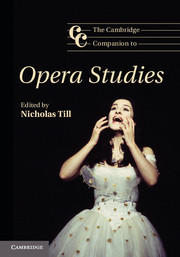Book contents
1 - Opera, the state and society
from Part One - Institutions
Published online by Cambridge University Press: 05 December 2012
Summary
In a volume in the ‘Cambridge Studies in Opera’ series, Victoria Johnson has pointed to the ‘blossoming of opera studies’ that has occurred in recent decades in the wake of the cultural and historical ‘turns’ experienced by the social sciences and humanities since the 1970s. Two new directions in opera research which Johnson has termed the ‘material conditions’ and ‘systems of meaning’ approaches have reshaped in a fundamental way our thinking about the relationship between opera, the state and society, and in so doing have laid a firm foundation for further work in this area. While the ‘systems of meaning’ paradigm with its roots in the New Cultural History has reconstructed the time-bounded ‘horizons of expectation’ that opera’s librettists, composers and audiences shared during different periods of the genre’s four-century lifespan, the ‘material conditions’ approach, strongly influenced by social history, has delineated the ways in which political and legal – as well as social and economic – factors have shaped operatic production and reception.
This research has uncovered three paradigmatic systems of production and reception that one might call the impresarial, the statist and the impresarial-statist, each of which embodies a distinct pattern in the relationship between opera, the state and society. In the impresarial system, found in its purest form in Italy between the advent of public or commercial opera in 1637 and unification in 1861, in Britain until 1939 and in the United States right down to the present, central states and local governments create the framework conditions for opera production through the enforcement of contracts but provide only minimal financial assistance while leaving the organization of opera seasons in the hands of private businessmen (the impresarios) or associations aiming – but often failing – to turn a profit. Local urban-based social and economic elites choose the opera house as a locus of sociability and status differentiation while influencing the character and content of works through their expectations and tastes.
- Type
- Chapter
- Information
- The Cambridge Companion to Opera Studies , pp. 25 - 52Publisher: Cambridge University PressPrint publication year: 2012
References
- 1
- Cited by

